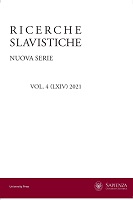La riflessione linguistica nella poesia bielorussa tra autoreferenzialità e performatività (1908-2016)
The Linguistic Reflection in Belarusian Poetry between Self-Referentiality and Performativity (1908-2016)
Author(s): Manuel GhilarducciSubject(s): Cultural history, Studies of Literature, Recent History (1900 till today), Belarussian Literature, Identity of Collectives
Published by: SAPIENZA UNIVERSITÀ EDITRICE
Keywords: language; identity; reflection; autoreferentiality; performativity; construction of society;
Summary/Abstract: The cultural-political status of the Belarusian language has always been very problematic. The long history of dominations resulted in the lack of a strong national consciousness and of a national élite and, therefore, in a difficult nation building. ‘Belarusianness’ and Belarusian language are not necessarily connected: one can regard themselves as Belarusian without speaking the Belarusian language in everyday life. Today, Belarus is still predominantly Russophone. Nonetheless, poetry in the Belarusian language has been trying to profile itself as a national literature by tackling the language question. As I argue, two fundamental aspects characterize the linguistic reflection in Belarusian poetry: autoreferentiality and performativity. On the one hand, poetry reflects upon itself when questioning the language of which it is made. On the other hand, the linguistic reflection is an antagonistic strategy that stages the power of language. The texts examined here oscillate between these two poles. Connecting autoreferentiality and performativity, Janka Kupala (1882-1942) articulated the idea of an immortal language with an extraordinary immanent force which can (and should) guide the national community. Soviet poets like Nil Hilevič (1931-2016) and Pimen Pančanka (1917-1995) complained about the difficulty to write as ‘national’ poets in a strongly Russified republic. In staging the ‘melody’ of their native language, they faced unsolvable individual and collective dilemmas. Post-Soviet poets like Val’žyna Mort and Julija Cimafeeva problematize the marginalization of those who (like them) dream of a cultural and political reorientation. Their oxymoronic and self-de(con)structive poetry attempts to settle the poet(olog)ical and subversive force of Belarusian language exactly in its absence and ontological negativity and to articulate a new idea of linguistic and cultural renaissance.
Journal: RICERCHE SLAVISTICHE. NUOVA SERIE
- Issue Year: 4/2021
- Issue No: 64
- Page Range: 105-126
- Page Count: 22
- Language: Italian

